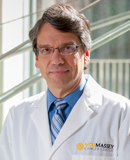
Associate Director of Clinical Research at the Massey Cancer Center, Professor in the Division of Hematology, Oncology and Palliative Care in the Department of Internal Medicine and the Harrigan, Haw, Luck Families Chair in Cancer Research*
Last post: University of Texas Southwestern Medical Center and the Statewide Clinical Trials Network of Texas
In his role as associate director for clinical research at the Massey Cancer Center, Charles E. Geyer, Jr., M.D., F.A.C.P., oversees the development of oncology clinical trials. It’s a role he is uniquely suited for because of his expertise in designing and conducting clinical research studies.
Most recently, he was the president and chief medical officer of the CTNet, a research collaboration of academic and community-based cancer centers across Texas. Prior to that, he oversaw development and conduct of clinical studies as the director of medical affairs at the National Surgical Adjuvant Breast and Bowel Project in Pittsburgh. In addition, he was the founding co-chairman of the National Cancer Institute’s Breast Cancer Steering Committee, which reviews and prioritizes phase 3 and large phase 2 research trials.
Now Geyer will direct his attention to expanding Massey’s participation in multi-center trials launched by groups like the NSABP. He’ll also develop infrastructure to support Massey researchers in rapidly translating their own laboratory discoveries into new clinical trials. “We’ll be collaborating more with community oncologists because we want to take the promising discoveries of VCU scientists and offer them quickly to patients across the state through a vibrant clinical trials network,” he explains. “I’m excited by the strong commitment at Massey and the VCU School of Medicine to enhancing and expanding the clinical research program.”
This article by Jennifer Uscher first appeared in the fall 2013 issue of the Dean’s Discovery Report.
Geyer’s own research focuses on treatments for HER2- positive breast cancer. In women with this cancer, a genetic mutation causes breast cancer cells to make too much of a protein called human epidermal growth factor receptor 2 (HER2) that causes the cancer cells grow and divide faster.
Geyer has led studies that paved the way for the FDA’s approval of drugs that block the effects of the HER2 protein. He served as co-lead investigator on the pivotal Tykerb trial and was a lead investigator in the landmark clinical trial that showed the breakthrough drug Herceptin added to chemotherapy was more effective than standard chemotherapy alone in early stage HER2-positive breast cancer.
Geyer currently is co-chair of the scientific steering committee for a new global trial looking at using the recently approved drug for resistant HER2 positive metastatic breast cancer, Kadcyla, as an alternative to Herceptin in women with resistant HER2-positive early stage breast cancer.
*expected academic investiture in fall 2013

